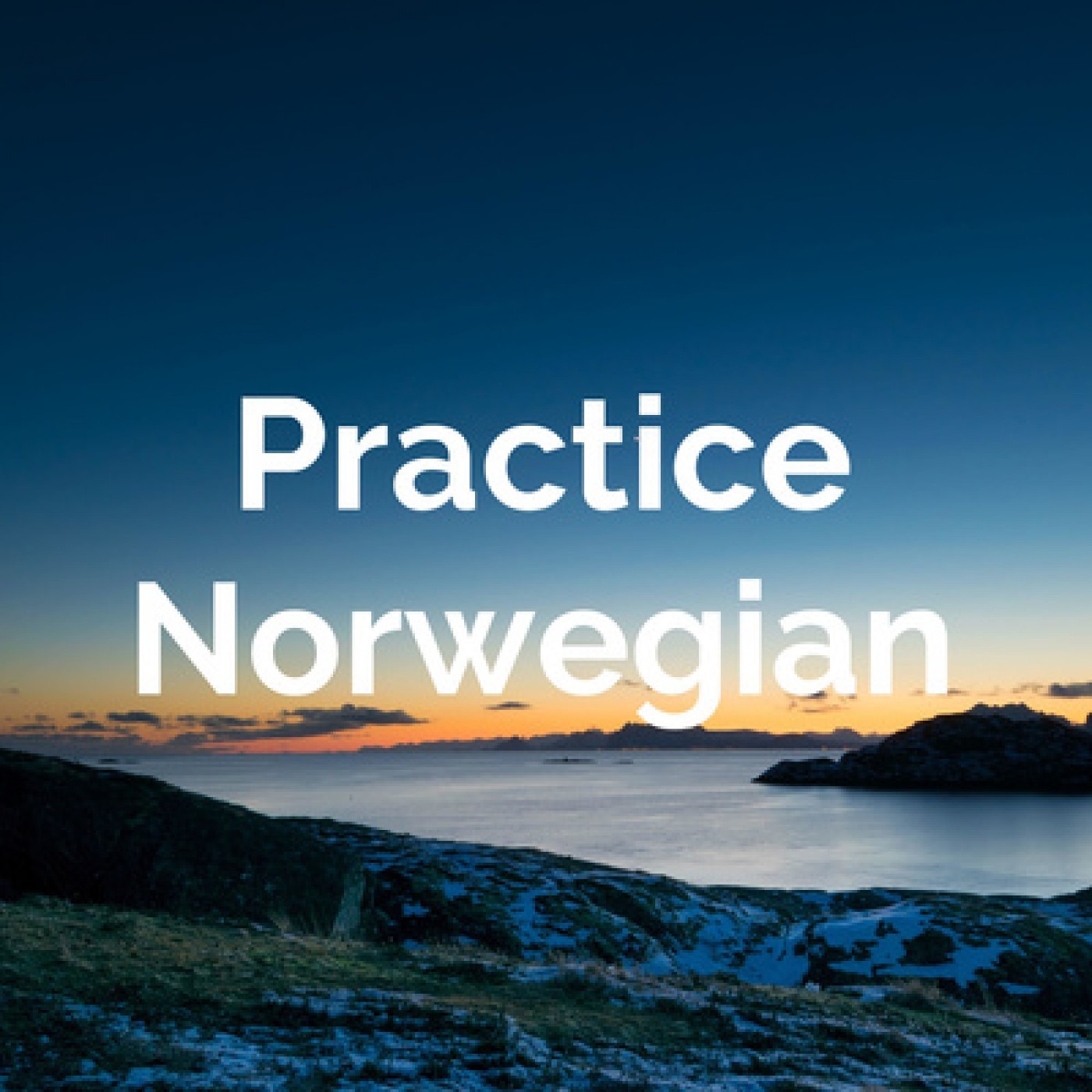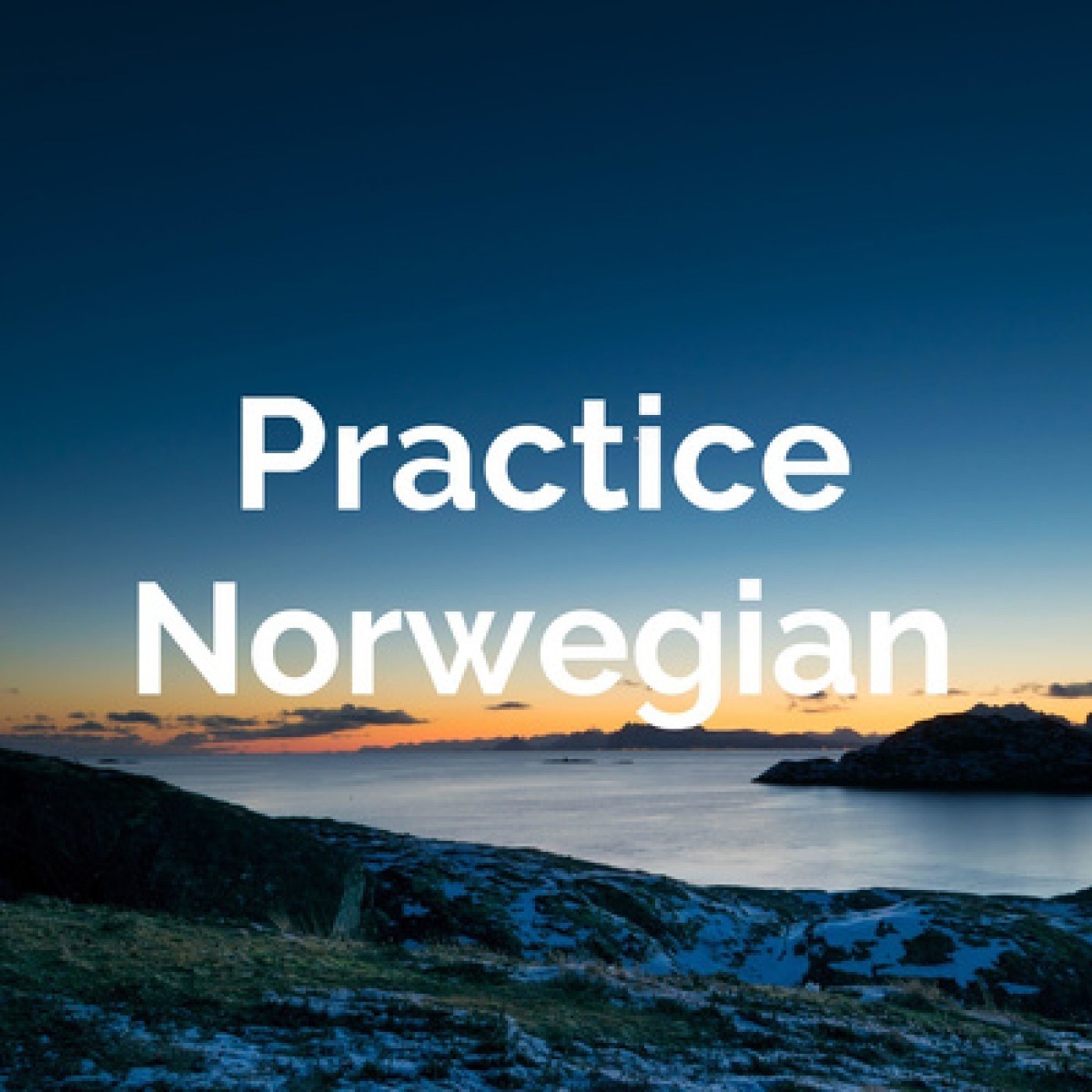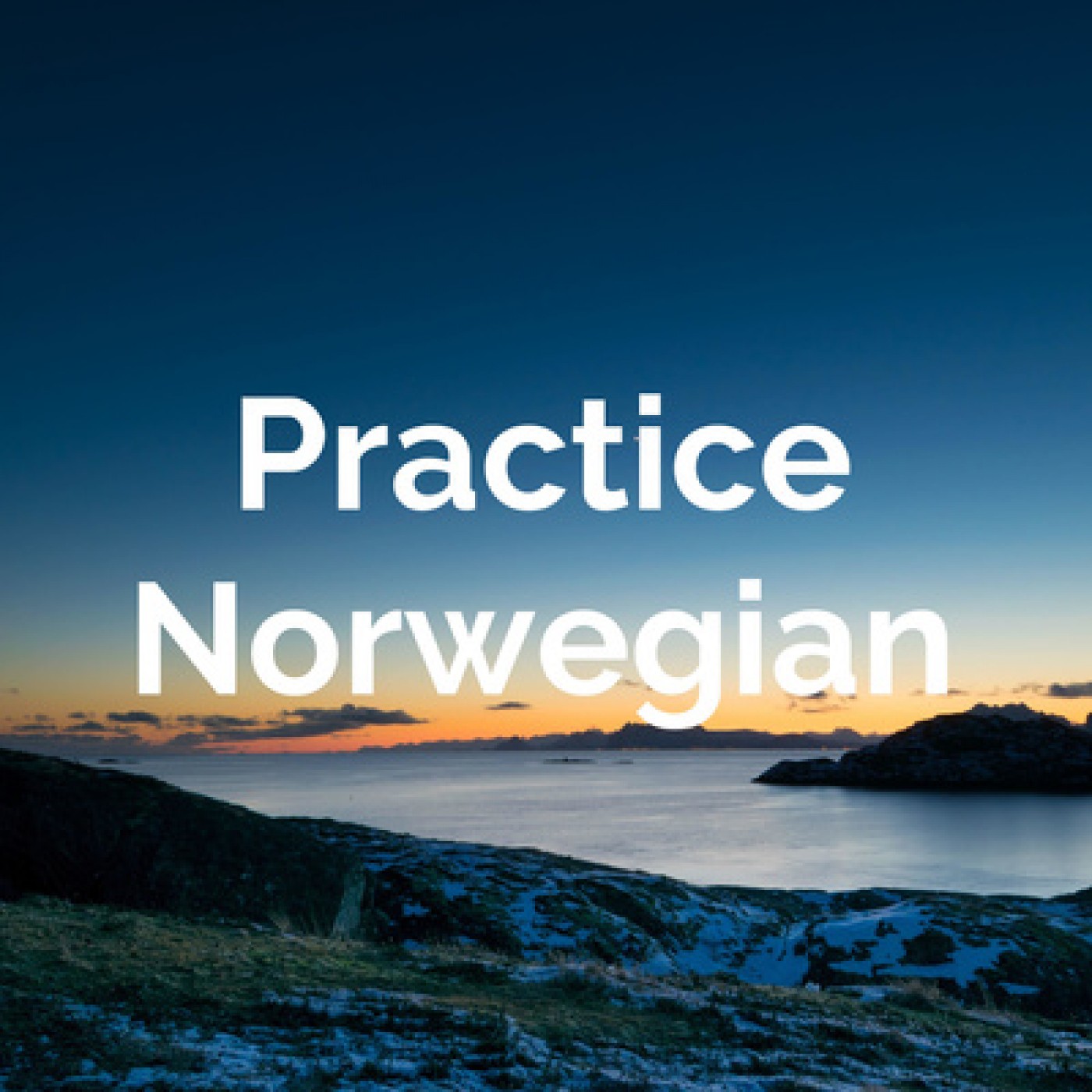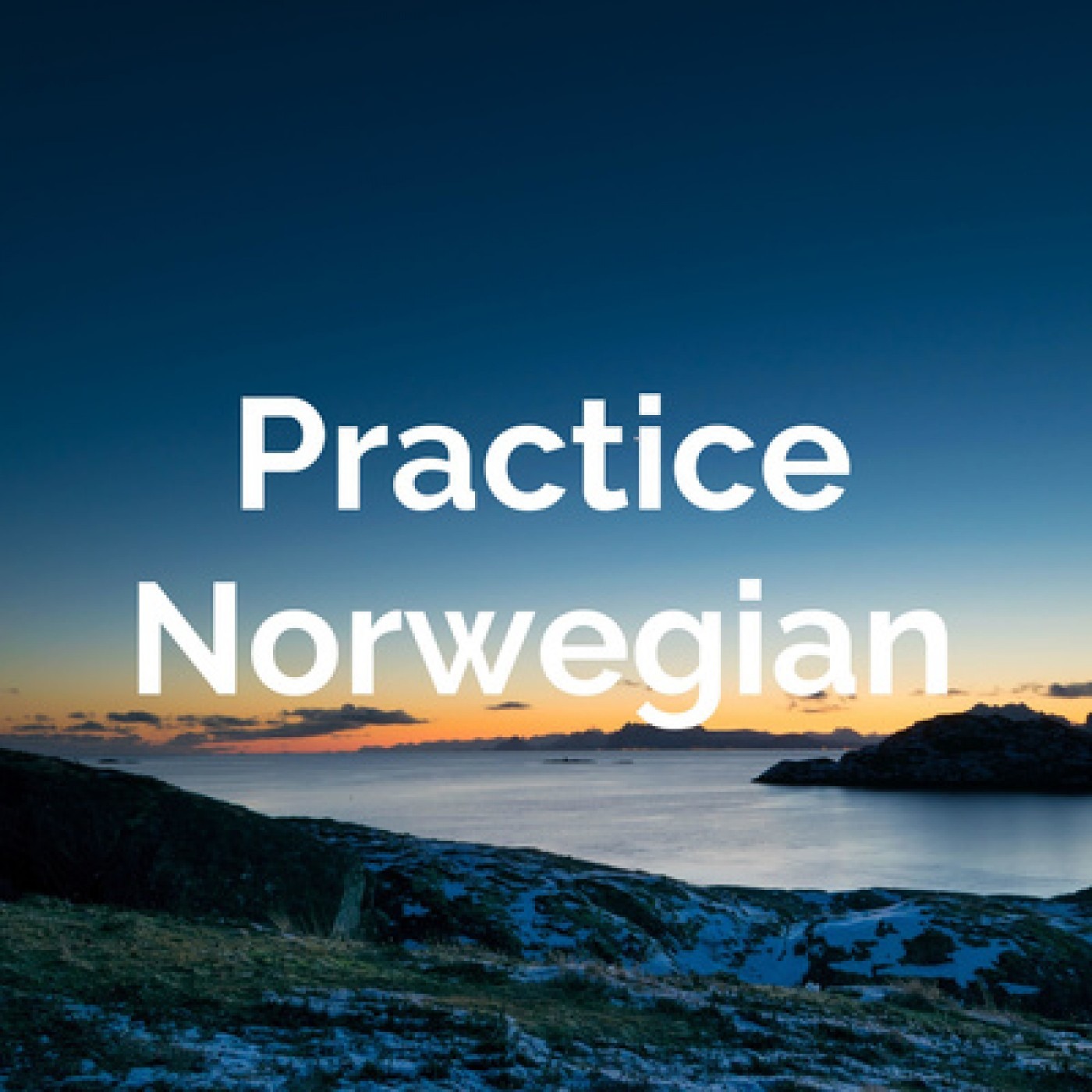Discover Practice Norwegian
Practice Norwegian

Practice Norwegian
Author: Norwegian Language Lessons
Subscribed: 243Played: 3,817Subscribe
Share
© Norwegian Language Lessons
Description
Comprehensive language and grammar training in Norwegian!
For weekly essays w/podcasts: http://dailynorwegian.com/subscribe
Welcome! 😄
48 Episodes
Reverse
Want to learn Norwegian?Today we're launching a completely new weekly email course - a complete A1 level with stories, dialogues, grammar, and exercises!Here is an excerpt from the first episode "Hei! Hva heter du?"På kafé:- Hei!- Hei, hva heter du?- Jeg heter Petter. Hva heter du?- Jeg heter Lise.- Hyggelig å treffe deg!I parken:- Hei, hvordan går det?- Bra, og du?- Bra! Hvor kommer du fra?- Jeg kommer fra Brasil. Og du, Victoria?- Jeg kommer fra England.For just $6/month you'll get a new lesson every week right into your inbox, and you can also view the episode with audio files and exercise on a separate webpage.Subscribe at dailynorwegian.com/subscribe !Advertising Inquiries: https://redcircle.com/brandsPrivacy & Opt-Out: https://redcircle.com/privacy
In this episode we'll crack the code on "mot" vs. "imot" - an often overlooked grammar point. Discover how "imot" intensifies resistance and opposition beyond simple "mot" - turning basic disagreement into active resistance ("stå imot presset," "gå imot strømmen"). Master these patterns and sound like a native speaker!And Gift Subcriptions are ready! Give Norwegian fluency to someone you care about! Just $6/month gets them weekly essays with native audio, vocabulary, and exercises. Perfect for professionals, culture enthusiasts, or anyone working towards mastering Norwegian. Subscribe at dailynorwegian.com/subscribe and reply with recipient details, or just email us at info (at) dailynorwegian.com directly.Plus: Experience authentic Norwegian through an excerpt of Emma's fictional Old Norse music journey. From Manchester university lectures to Viking-era poetry, listen to how she connects with thousand-year-old traditions through words like "Valhall," "skald," and ancient lyre melodies.Ready to transform your Norwegian? Start your subscription or gift one today: dailynorwegian.com/subscribeHa en super dag!Advertising Inquiries: https://redcircle.com/brandsPrivacy & Opt-Out: https://redcircle.com/privacy
Discover the fascinating dual nature of Norwegian "skulle" and transform your understanding of this essential modal verb in the past tense! The word carries two distinct meanings that context reveals beautifully.We'll look at the difference between when e.g mythology speaks of "Muren og havet skulle beskytte det nye landet mot jotnene" (The wall and sea were to protect the new land from the giants), vs. expressions like "Han skulle møte meg på kafeen i går", which would usually imply that it did not happen as planned. And we have many more examples!We've also made many more Weekly Essays about "Pusse opp hjemmet" (to renovate), about "Bobil eventyr i Jotunheimen" (Campervan adventure in the national park Jotunheimen), and several new business language essays as well. And as always you can build powerful vocabulary foundations with ready-to-import flashcards for Brainscape, Anki, and all the major learning platforms!Visit dailynorwegian.com/subscribe to unlock advanced Norwegian understanding with weekly essays and mini-podcasts with flashcard support for just $6/month - today!Advertising Inquiries: https://redcircle.com/brandsPrivacy & Opt-Out: https://redcircle.com/privacy
Learn the essential Norwegian distinctions for "to finish" - slutte (ends/quits), ferdig (finished), and fullføre (complete) - plus key phrases like "slutten av," "slutten på," and "til slutt." These expressions often appear in Norwegian conversation, and mastering their specific uses will make your speech sound much more natural!And we have more exciting news for Weekly Essay subscribers! Your vocabulary now comes with ready-to-import flashcards for Brainscape, Anki, Memrise, and all major learning apps. Transform every essay's essential words and phrases into powerful study sessions that fit your routine. Perfect for commuting, coffee breaks, or focused vocabulary building.Get clear examples, usage patterns, and practical tips for incorporating these "finish" expressions into your Norwegian, and discover how flashcards can accelerate your vocabulary retention from the weekly essays.Visit dailynorwegian.com/subscribe to start building your Norwegian vocabulary deck today!Advertising Inquiries: https://redcircle.com/brandsPrivacy & Opt-Out: https://redcircle.com/privacy
The hardest part of learning Norwegian? Listening comprehension usually lags behind your other skills. Native speakers talk fast, words blur together, and audio-only content leaves you guessing.That's why we've launched the Daily Norwegian Essay Series - weekly essay subscriptions that combine written text with native audio recordings. See the words while hearing them. Build vocabulary systematically. Practice with real topics that matter.Choose your level:Intermediate Norwegian: Cultural stories and everyday lifeBusiness Norwegian Advanced: Boardroom meetings and professional scenariosEach essay includes:✓ Native speaker audio with crystal-clear pronunciation✓ Essential vocabulary with translations✓ Comprehension questions and full solutions✓ Permanent archive access to all previous essays✓ Audio snippets for key vocabulary practiceThe topics and vocabulary comes from 14 years of teaching and over 8,000 one-on-one lessons with people from all walks of life, and with business professionals at e.g. Google, Kongsberg Gruppen, McKinsey & Co, several independent Business Consultancies, JP Morgan, BBC, Halliburton and other companies across the globe.Just $6/month gets you 4-5 complete essays with mini-podcasts. Cancel anytime.See sample topics and subscribe: dailynorwegian.com/subscribeQuestions? info@dailynorwegian.comHa en super dag!Advertising Inquiries: https://redcircle.com/brandsPrivacy & Opt-Out: https://redcircle.com/privacy
Good morning, and welcome! 🌇☕️ :)
This is the first episode of the Beginner Series on the Practice Norwegian Member Podcast, building on the Basic Grammar series!
For full transcripts of all the 50 Beginner Episodes, incl. summery of the Basic Grammar, visit here! https://www.amazon.com/dp/B09F16LK2 (https://www.amazon.com/dp/B09F16LK2W)
And get new "Morning Coffee" episodes twice a week - plus pronunciation tips, etymology for over 80 Norwegian words, and over 200 beginner, intermediate and advanced episodes here!
http://patreon.com/practicenorwegian (https://www.patreon.com/practicenorwegian) - Welcome!! 😊
Ha en super dag!
☀️😊🏞
Advertising Inquiries: https://redcircle.com/brands
Privacy & Opt-Out: https://redcircle.com/privacy
Updates!
Get new Morning Coffee episodes every morning on weekdays - plus 50 beginner episodes, pronunciation, etymology, and over 150 intermediate/advanced episodes! Visit: http://patreon.com/practicenorwegian - Welcome!! 😊
..
For more reading of Hamsun (and the 4th episode), please visit our Practice Norwegian Member Podcast here! 😊😊🎙🌟https://www.patreon.com/practicenorwegian
The novel "Sult" can be found here - it's older Norwegian from the original edition, and it's the text we're using in these episodes! https://www.amazon.com/dp/B09F1CGQJJ (Note: US/CA/AU store only)
Thanks so much for listening, and enjoy! :))
😄🌿☀️🏞🏞
:)
Advertising Inquiries: https://redcircle.com/brands
Privacy & Opt-Out: https://redcircle.com/privacy
In this episode we're starting a new little series about small bits of helpful and useful expressions, that are common in everyday speech.
And a very helpful way of not repeating the whole phrase in a reponse to a question, we often say f.ex. "Yes, I can" or "Yes, I do".
Ex:
Kan du sykle? Ja, det kan jeg.
Vil du spise? Ja, det vil jeg.
Sykler du til jobben? Ja det gjør jeg.
The rule is this:
kan, vil, skal, må + er/har in the question => repeat the verb in the response.
All others verbs as question => put "gjør" in the response.
Fill-ins:
Er du glad i dag? Ja, det ... jeg.
Kan du spille gitar? Ja, det ... jeg.
Drikker du kaffe? Ja, det ... jeg.
..
Great! Well done :))
😊
Advertising Inquiries: https://redcircle.com/brands
Privacy & Opt-Out: https://redcircle.com/privacy
In this episode we'll read further about the starving writer/artist in old Kristiania in the late 18 hundreds - and his venturing out into the streets.
Thanks for listening,
and enjoy! :)
Advertising Inquiries: https://redcircle.com/brands
Privacy & Opt-Out: https://redcircle.com/privacy
Get new episodes every morning on weekdays! Plus 50 beginner episodes, pronunciation, etymology, and over 100 intermediate/advanced episodes! Visit: http://patreon.com/practicenorwegian (https://www.patreon.com/practicenorwegian) - Welcome!! 😊
..
In the episode we'll go through the difference bewteen "da"/"når", both meaning "when", and then helping verbs in the past tense!
In short for "when":
"Da" is for "Once in the past"
"Når" for everything else
Ex:
Da jeg var fire år.
Når man studerer.
Hjelpeverb:
kan - kunne
vil - ville
må - måtte
skal - skulle
bør - burde
Examples:
Hun kunne ikke komme fordi hun var syk.
De skulle gå hjem før det ble mørkt.
Ole burde spille mer musikk.
Fill-ins:
Da jeg var liten, ……... jeg ikke snakke italiensk. (kan)
De ……... pakke kofferten kvelden før. (må)
..
CONGRATULATIONS!!!! 🎉🎉🎉🎇🎇🎇🎊🌟🌟 :))
A2 level of Grammar is finished!!
Well done, and fantastic work!! Fantastisk jobbing!
:DD
😊
Advertising Inquiries: https://redcircle.com/brands
Privacy & Opt-Out: https://redcircle.com/privacy
In this episode we'll go through some very common (and consistent) expressions with time prepositions, and these are mostly just for remembering them :)
Ex:
Han er hos legen.
Vi trener om kvelden.
Vi skal sove ute i natt.
Han spiller gitar på onsdag.
Om høsten er det fine farger.
..
Thanks for listening,
and Great Work!! 😊
Advertising Inquiries: https://redcircle.com/brands
Privacy & Opt-Out: https://redcircle.com/privacy
In this episode we'll look at the two main ways of saying "I think" in Norwegian, with:
synes = opinion (something you have experienced)
tror = guessing/believing
Examples:
Jeg synes filmen var bra.
Jeg tror kaken er god.
Fill-ins:
Jeg har lest boka, og jeg ……... den var bra.
Jeg ……... vi har ferie i juli, men jeg er ikke sikker.
..
Great work!!
:D
Advertising Inquiries: https://redcircle.com/brands
Privacy & Opt-Out: https://redcircle.com/privacy
In this episode we'll look at the comparative and superlative form of the adjective,
which in general is to add "-ere" and "-est".
Ex:
fin, finere, finest
varm, varmere, varmest
Fill-ins:
Han er ………. i klassen. (høy)
Jobben er ………. enn han trodde. (vanskelig)
Some exceptions:
stor, større, størst
god, bedre, best
ung, yngre, yngst
Fill-ins:
Han er ……… enn henne. (ung)
Han vil bli ……… etter sommeren. (god)
..
And in addtion, when the superlative (best, størst, finest, eldst) is used as adjective with a specific noun,
we add an "-e" at the end;
Det største huset.
Den eldste byen.
..
Excellent work,
and thanks for listening!!
😊🎉
Advertising Inquiries: https://redcircle.com/brands
Privacy & Opt-Out: https://redcircle.com/privacy
In this episode we'll look at when to use the "sin" concept, and how to find the right ending.
1. The endings follow the object they belong to;
Han legger sønnen sin.
Han er på øya si.
Han vasker huset sitt.
Han mister nøklene sine.
2. The condition for using "sin" is as follows:
"If the subject is in the 3. person (he,she,they), and the object belongs to the subject, replace hans/hennes/deres with sin/si/sittt/sine! :)
3. The two most common "traps" are;
- be sure what the subject is
- with subclauses; find subject and object again
FIll-ins:
Han reiser på tur med kona …….. (his own).
Han og kona ……. (his own) reiser på tur sammen.
Han sier at kona ……. er hjemme i dag.
..
This might be the hardest item in the grammar - but once the subject/object part is more clear, everything becomes more easy!
And,
Great work!! :D
😄
Advertising Inquiries: https://redcircle.com/brands
Privacy & Opt-Out: https://redcircle.com/privacy
In this episode we'll hear about the main person thinking about his efforts to get assignments as a writer and applying for work at the local Firestation.
He then ventures out into the street, and his moods changes into heightened confidence - slightly influenced by his debilitating hunger.
Jeg-personen går i denne episoden ut av huset og møter folkene i gatene. Det er en livlig scene som fyller han med nytt mot og vi ser hvordan sulten påvirker opplevelsen og persepsjonen av livet og folkene rundt ham.
Thanks for listening,
and enjoy!
Advertising Inquiries: https://redcircle.com/brands
Privacy & Opt-Out: https://redcircle.com/privacy
In the episode we'll expand slightly on the topic of the subclauses, and look at what happens if you start a sentence with a subclause.
The rule is this;
The subclause itself remains exactly the same as before, but afterwards you put a comma, and then the verb.
Example:
Hvis sola ikke skinner, drar vi hjem.
Hvis bussen ikke kommer, må vi løpe.
To fill in:
Hvis barna ikke er sultne, _______ (spiser - senere - vi)
Fordi han ikke var syk, _____ (de - hjem - dro)
..
Excellent work!!
😊
Advertising Inquiries: https://redcircle.com/brands
Privacy & Opt-Out: https://redcircle.com/privacy
In Norwegian language there is a slight change in word order every time you have a subclause with an adverb.
Ex:
Det er ikke regn. (Normal sentence)
Hun sykler fordi det ikke er regn. (Subclause with "fordi")
The rule is this:
1. subjunksjon (hvis, at, fordi.. osv.)
2. subjekt (person/ting)
3. adverb (ikke, ofte, sjelden, aldri etc.)
4. verb
Fill-ins:
Marco sier ............................... (han - sykler - aldri - at).
Britt drar på ferie ............................... (hun - er - syk - ikke - hvis).
Butikken stenger ............................... (det - er - kunder - ikke - fordi).
..
Great work! :))
Advertising Inquiries: https://redcircle.com/brands
Privacy & Opt-Out: https://redcircle.com/privacy
In this episode we'll look at how to make specific forms of the nouns with an adjective included.
Examples:
en stor bil - den store bilen
et fint hus - det fine huset
mange snille gutter - de snille guttene
The formula is this:
den/det/de + adjective in plural form + specific form of the noun
Fill-ins:
En glad gutt - ………...
Et stort hus - ………...
Mange røde tak - ………..
Mange nye sko - ………...
Bra!
..
Also; when we talk about the different regions of a country, we use "i" or "på" like this:
i Sør-Norge
på sørlandet
...
Great work,
and thanks for listening!
:))
Advertising Inquiries: https://redcircle.com/brands
Privacy & Opt-Out: https://redcircle.com/privacy
First reading from the novel "Sult" by Knut Hamsun, about a starving artist in Kristiania (Old name for "Oslo") in the late 18 hundreds.
The person is waking up and is struggling with his life and his work as a writer, with a vivid inner life.
The novel "Sult" can be found here - it's older Norwegian from the original, and the text we're using in these episodes!https://www.amazon.com/dp/B09F1CGQJJ (https://www.amazon.com/dp/B09F1CGQJJ) (Note: US/CA/AU store only)
Thanks for listening,
and enjoy!
Advertising Inquiries: https://redcircle.com/brands
Privacy & Opt-Out: https://redcircle.com/privacy
In this episode we look at three expressions for time:
Ago (for .... siden)
Duration (i)
Future (om)
Ex:
Ole kom til Norge for fire år siden.
Han skal være på ferie i to uker.
Berit skal til byen om to timer.
Fill-in:
Han reiste i fjellet ….. tolv år …...
Hun skal reise ….. tre dager. (duration)
Ole skal til Kina ….. tre uker. (future)
2. Genetiv.
General rule: Put "s" at the end, and unspecific form of the noun.
Boka til Lise.
Lises bok.
Fill-in:
Brillene til Hanne.
Huset til Per og Lisa.
Koppene til Petter.
..
Well done! 🎉🙋🏼♂️
A1 Level in Norwegian Grammar is completed!! This is half of the beginner's level already!
Veldig bra - gratulerer!
🎊🎇😊
Advertising Inquiries: https://redcircle.com/brands
Privacy & Opt-Out: https://redcircle.com/privacy









your teaching is great, I have learned a lot from your posdcast that I did not from books or other educational stuff.. great job, thanks